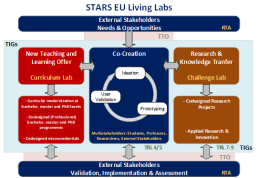The term Living Lab is nowadays frequently used, referring to a wide variety of local experimental projects of participatory nature. A shared definition or common understanding on what a Living Lab is, though, still lacking. However, among all the possible definitions, several key elements that are essential to a Living Lab can be identified:
Experiments in real environments: Living Labs do not test new solutions in specifically designed environments, but conduct experiments in real life, whether in a street, a neighborhood, a city, a region or even a country. Co-creation and end-user involvement: Co-creation and end-user involvement are essential to the development of innovation. This cooperative process allows all partners, especially the end user, to influence experiments, creating innovative products or solutions that are valued and accepted by all partners, and therefore sustainable in the long term. Multidisciplinary and multi-stakeholder participation: Multidisciplinary and multi-stakeholder competencies are promoted, including representatives of public authorities, knowledge institutes, industrial partners and citizens. This helps to extend the traditional boundaries of developed innovations and encourages “out of the box” solutions. The multi-method approach combines co-creation methodologies from all disciplines, selecting the most appropriate one. Iterative learning cycle: Innovations are developed following “plan-do-check-act” cycles. Evaluation results enhance this new experimental “plan-do-check-act” cycle, enabling continuous learning and adaptation, interaction between partners, trust building and inspiration for others to learn and innovate.
Why STARS EU needs Living Labs
The primary objectives of STARS EU Living Labs are to foster collaboration among diverse stakeholders and drive innovation that addresses pressing societal challenges.
Identify needs and opportunities from diverse sectors, including industry, private enterprises, public institutions, and social organizations. By actively engaging with stakeholders from these sectors, we aim to gather insights and challenges that can inform research and educational agendas and drive innovation. Facilitate Collaboration as Living Labs Bring together the academia (professors, researchers and students) with stakeholders from industry, local government, social sector and the community to collaborate on innovative solutions, either through research and training. Address Global Societal Challenges and Sustainable Development Goals. The Living Labs will identify and tackle these challenges namely integrating them with the work being done in the Thematic Interest Groups, through innovative and creativity methodologies, based on interdisciplinary and user-centered approaches, that will be communicated to the curricular development experts and research experts for knowledge and technology development and later transfer. Foster inclusive and sustainable regional development through collaborative innovation for societal well-being, contributing to society and regional prosperity. Promote Innovation, as the STARS EU Living Labs will encourage the development and testing of novel ideas, and will feed the research centers with the need for applied research towards the development of new products, technologies, and practices that have the potential to create positive impact and transform industries and communities. Promote Teaching and Learning Innovation, as the STARS EU Living Labs will encourage the modernization of curriculum and the continuous co-design of new upskill and reskill offers, impacting the employability and lifelong learning perspectives into a more skilled generation. Support Economic Development. STARS EU Living Labs will drive economic growth and competitiveness by fostering entrepreneurship, creating new business opportunities, and promoting knowledge and technology transfer. Enable Knowledge Exchange, regionally between stakeholders, and internationally within and beyond STARS EU alliance. Facilitate the exchange of knowledge, expertise, and best practices among stakeholders, leading to mutual learning, capacity building, research and economic development.
Digitalization and productivity
STARS EU Living Labs are operated within the scope of the governance structure Regional Transition Accelerator and cooperates with both Curriculum Lab and Challenge Lab. Each Living Lab will act as a multistakeholder partnership involving students, professors, researchers, industry, social sector, public entities and the civil society towards needs and opportunities identification, which after a co-creation ideation phase will be used as challenges by the Thematic Interest Groups (TIGs) towards new academic offers or new research oriented projects. The following graphic intends to represent the concept and the operational working plan of STARS EU Living Labs.

